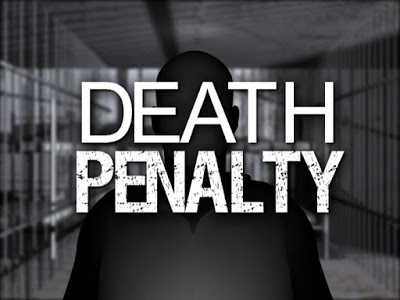World Day Against the Death Penalty: HURILAWS, LEDAP draw attention to negative impact of death penalty on children
death penalty.
death penalty and raise awareness on the conditions and the circumstances which
affect prisoners with a death sentence.
The day was first organised by the World
Coalition against the Death Penalty in 2003. The theme for this year is Children:
Unseen victims of the death penalty.
sentences and executions, Amnesty International recorded that in Nigeria; at
least 19,336 people were on death row. Many of these people have children
connected to them either as daughters, sons, nephews, nieces etc.
person who is sentenced. Members of the sentenced person are also collateral
victims.
children of parents sentenced to death or executed have been referred to as the
‘invisible’ or ‘forgotten’ victims of the death penalty, whose experiences are
often overlooked and whose rights are rarely considered in criminal justice
processes.
sentenced to death or whose parents are on death row carry a heavy emotional
and psychological burden that amount to the violation of their human rights and
most of them often come from poor families and/or are from minority groups.
enshrined in the Convention on the Rights of the Child is a very distant dream
for these children.
the looming threat of execution can prolong and exacerbate issues.
executions do take place, this permanently deprives the child of the parental
relationship and it has been found to cause specific traumas and some of these
issues constitute violations of the rights under the UN Convention on the
Rights of the Child (CRC) and the African Charter on the Rights and welfare of
the child.
prominently, given the associated impacts, the imposition of the death penalty
on a parent may constitute a violation of States’ obligations to protect
children from all forms of physical or mental violence under Article 19 of the
CRC.
child are a primary consideration in all decision-making affecting them,
including those relating to their parents.
may need immediate alternative care arrangements. This can be complicated in
cases where children are related to both the victim and (alleged) offender,
such as domestic murders.
for the children because of their association with the suspected offender.
death penalty, especially in Africa. Since the 1980s, there has been a global
trend towards the abolition of the death penalty, a trend which continues to
this day. 20 countries in sub-Saharan Africa have abolished the death penalty
for all crimes.
reinforced its position as a beacon of hope for abolition.
countries in this region gives fresh hope that the abolition of the ultimate
cruel, inhuman and degrading punishment is within reach, particularly as it has
been shown to have a more adverse effect on the children(s) of the victims.
majority of the world’s states) had abolished the death penalty in law for all
crimes, and 142 countries (more than two-thirds) had abolished the death
penalty in law or practice.
steps to reduce and repeal the death penalty well into 2018, the isolation of
Nigeria from the world’s remaining non-executing countries would not be starker.
State legislators and executives in Nigeria to:
Put in place an official moratorium on the imposition of death sentence
and the carrying out of executions on the parent of a child
evaluation of the actual impact of the implementation of current legislation
and policies in their State related to the death penalty, to assess the impact
on children of the parental death penalty. Consider all aspects of children’s
rights in this evaluation, including the right to be free from inhuman
treatment, and the rights to health, education, and an adequate standard of
living. Engage in thorough communication with children to facilitate their
meaningful participation in this process, and to identify their best interests,
using child-friendly procedural safeguards.
processes for legislative decisions made concerning the death penalty to ensure
full consideration and respect of the human rights of children.
Enact legislation that requires in law the detailed procedural steps for
conducting a best interests of the child assessment as set out in the UN
Committee on the Rights of the Child’s General Comment on the best interests of
the child, and include a provision explicitly requiring that such an assessment
be conducted before any sentencing decision is made that impacts a child.
Ensure that all the procedural requirements set out in this legislation are
disseminated to both prosecutors and judges.
Enact into legislation the requirement that all State actors whose
actions impact the children of parents sentenced to death or executed be
educated about the impact of the parental death penalty on children, and the
international legal standards that protect the child’s best interests.
State Judiciaries in Nigeria to:
Refrain from sentencing a parent to death in line with the presumption
against executions of parents as set forth by the UN Human Rights Committee.
Lead on or contribute to the design and implementation of transparent
and objective processes for all decisions related to the death penalty that are
made by sentences that affect children.
Insist on the best interests of the child assessment for each case of a
parent who may be sentenced to death or executed.
until the assessment is completed and fully considered.
Ensure that any decision on the death penalty is made in full compliance
with the best interests procedures set out in the General Comment on the
child’s best interests of the Committee on the Rights of the Child.
Pamela Okoroigwe (LEDAP)

